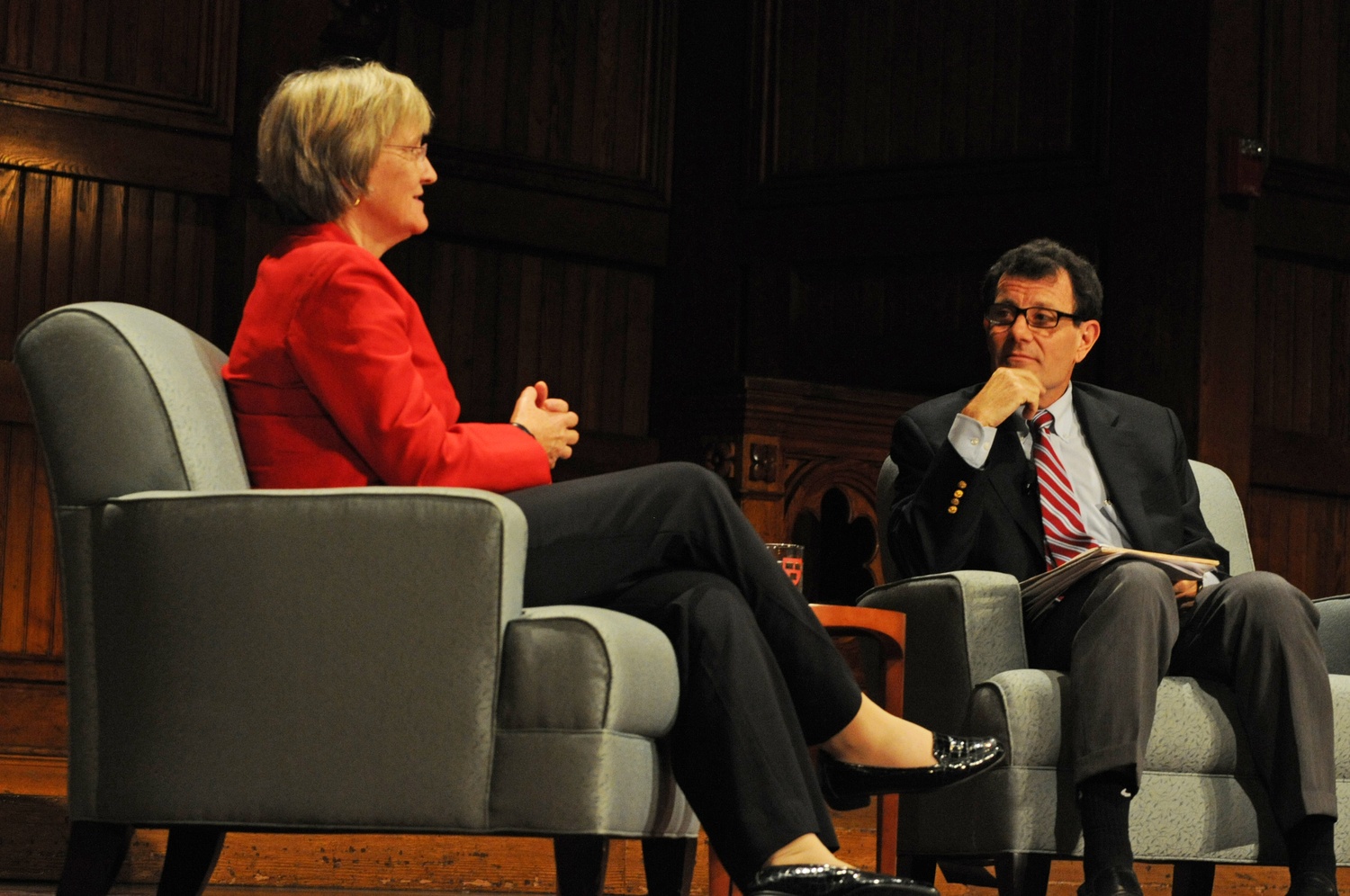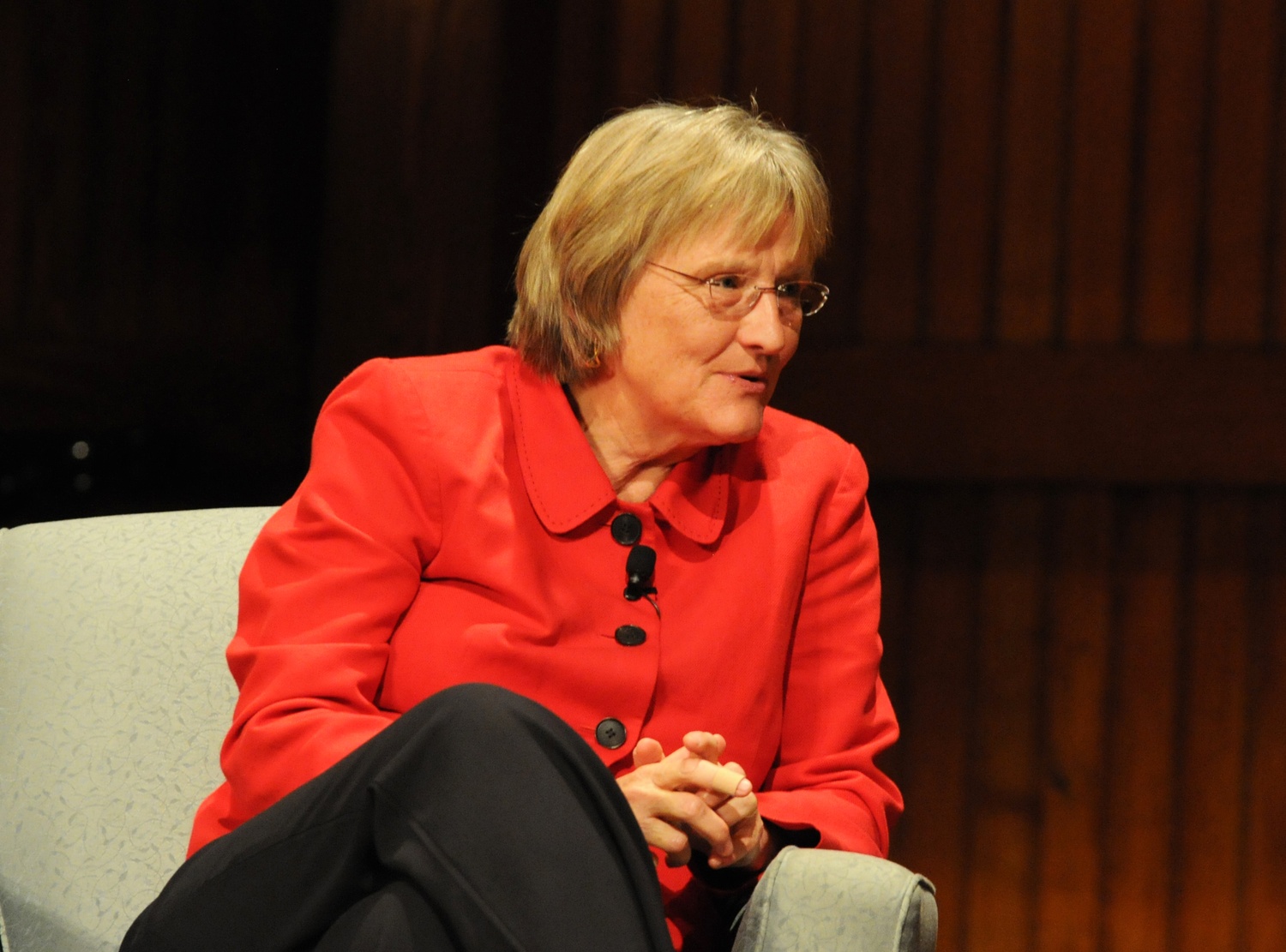
News
HMS Is Facing a Deficit. Under Trump, Some Fear It May Get Worse.

News
Cambridge Police Respond to Three Armed Robberies Over Holiday Weekend

News
What’s Next for Harvard’s Legacy of Slavery Initiative?

News
MassDOT Adds Unpopular Train Layover to Allston I-90 Project in Sudden Reversal

News
Denied Winter Campus Housing, International Students Scramble to Find Alternative Options
Faust Talks Campaign, Harassment, Admissions in Kristof Conversation

Nicholas D. Kristof ’81, a columnist for the New York Times and a Harvard overseer, took his notebook to the stage of Sanders Theatre on Tuesday afternoon for a wide-ranging interview with University President Drew G. Faust.
In front of a three-quarters full theatre, Kristof was not shy with his questions, asking Faust to defend Harvard’s ongoing capital campaign in light of the school’s massive endowment—at last report, it was worth nearly $33 billion—as well as legacy admissions and the University’s handling of sexual assault.
Early in the program, Kristof steered the conversation to the capital campaign, which has jumped off to a lightning start and aims to raise $6.5 billion by 2018. He reiterated a question raised by others about why Harvard needs more money.
In response, Faust stressed that Harvard is uniquely positioned to effect change, through its students and its research, around the world.
“When we see what we’re not able to do, and what would be possible, that’s how we justify that [endowment],” Faust said in a long answer that highlighted Gerald L. Chan’s recent $350 million gift to the School of the Public Health as well as the school’s ability to help respond to current health crises, like Ebola.
Throughout the conversation, Kristof pivoted frequently, jumping from topics like legacy admissions—Faust said that about 12 percent of Harvard undergraduates are legacies, and that while legacy students are admitted at a higher rate, they also have higher test scores and grades than the average applicant—to divestment, where she reiterated her long-held stance that dumping Harvard’s fossil fuel investments would politicize the University’s endowment in a way she does not support.

“I think divestment is not the direction towards making a difference on the climate issue. I think that our research, our teaching are fundamental to that effort, and that’s the best contribution universities can make,” she added.
The duo devoted significant attention to campus sexual assault, an issue that has captured national attention amid complaints that schools, including Harvard, are not doing enough to prevent assaults and take care of victims.
“One issue that has been in the news a lot around the country and here at Harvard has been sexual violence,” Kristof said. “Do you feel that the efforts that the University has been making as a whole are affecting the way things are actually unfolding on Saturday nights on campus?”
Faust responded in much the same way she has in recent months, declaring her intent to focus on prevention strategies as well as better investigatory and disciplinary procedures.
“Sexual violence has no place on this campus,” she said. “One of the most important approaches is to make sure it doesn’t happen in the first place, and that [goal] of prevention is one in which we are investing a lot of attention.”
Faust emphasized the importance of collecting more authoritative and comprehensive data on sexual assault, in an effort to answer the questions: “Is the type of program we’ve put in place the best possible one? What can we learn from other institutions?”
Asked by Kristof to assess the effectiveness of the University’s recently enacted policies around sexual harassment, Faust was optimistic. The new policies include a central office of sexual harassment investigators, adoption of the “preponderance of the evidence” standard, and beefed-up staff at the Office of Sexual Assault and Prevention.
“I would say yes, we’ve had an impact,” she said. “People are so much more aware of this and that is a good thing, but we have lots more to do in making sure that the different programs that we’ve introduced are having the most powerful effect.”
—Staff writer Matthew Q. Clarida can be reached at matthew.clarida@thecrimson.com. Follow him on Twitter @mattclarida.
Want to keep up with breaking news? Subscribe to our email newsletter.
